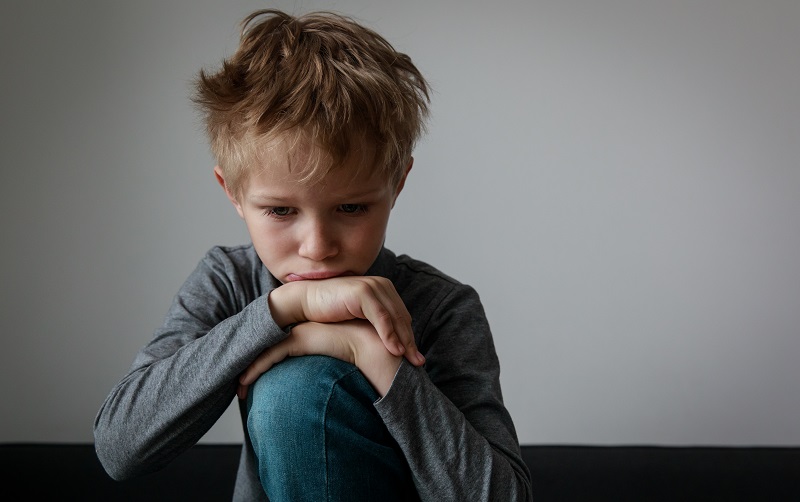Childhood Depression
Some people believe that only adults suffer from depression. But this is not true. Children and adolescents can also suffer from depression. Although children have times when they feel sad or down, occasional bouts of sadness are normal for children, adolescents, as well as adults. When feelings of sadness, and/or other depressive symptoms linger for longer periods of time this can signal childhood depression, as well as depression in adults.

Symptoms of Childhood Depression
Although we usually associate depression with sadness or feelings of unhappiness, an irritable mood, rather than a depressed mood or feelings of sadness, may dominate in young people. In addition to an irritable mood, depressed children may also show a range of other concerns.
Symptoms of depression in children include the following:
- Frequent bouts of sadness and/or irritability with indications that the young person feels this way much of the time.
- Low energy, and feelings of fatique or tiredness
- Low self-esteem, negative self talk and feelings of worthlessness.
- Feelings of hopelessness.
- Lack of interest in activities they once enjoyed.
- Sleeping problems, for example, problems falling asleep or sleeping too much.
- Eating problems, for example, eating more or less than usual.
- Poor concentration or difficulties paying attention.
- High levels of physiological arousal.
If you notice that the young person's symptoms of depression linger
for two weeks or it may help to address your concerns with your health care
provider.
What Causes Childhood Depression?
Risk factors for depression are multifacited and include a range of interconnected Neurobiological, biological, psychological and social factors which encompass both genetic and environmental factors. These factors are intertwined and their interplay is unique to each individual. Risks associated with childhood depression include negative stressors, such as learning and/or behavioral problems, social problems and being bullied. Trauma including chronic ongoing trauma and/or a single acute trauma like a motor vehicle accident may also be factors in childhood depression. Adverse Childhood Experiences (ACEs) which constitute chronic ongoing trauma, such as having a parent who suffers from a depressive disorder, or another psychological concern, for example, an anxiety and/or substance use disorder is a risk factor for childhood depression, and other mental health concerns.
Childhood Depressive Disorders
Disruptive Mood Dysregulation Disorder: This is a depressive disorder in children characterized by recurrent temper outbursts, such as verbal rages and/or physical aggression toward people and/or property. The symptoms must be present in two or three settings (i.e., at home, at school and with peers). The diagnosis must not be made in children less than six years of age or older than 18 years of age.
Major Depressive Disorder: This disorder is diagnosed in children and adults. Depressive symptoms occur in episodes of at least 2 weeks in length.
Persistent Depressive Disorder: This is a mild or moderate form of depression that can last at least two years.
Subtypes of Depression include Seasonal Affective Disorder (SAD) and Premenstrual Dysphoric Disorder.
Understanding the Problem is the Key to Solving It

Dr. O'Connor provides in depth, comprehensive psychological assessments to get to "the root "of the psychological concerns in a young person that worry you, " in this case,
what is contributing to and maintaining the depressive symptoms the young person exhibits. She tailors her psychological assessments to the specific needs of the young person who is showing symptoms of depression. Her psychological assessments provide a detailed, comprehensive understanding of the psychological problems that young people suffer. This understanding leads to diagnoses when appropriate and provides the
foundation required to support evidence based interventions as needed.
The psychological assessment explores the multiple factors that interact to contribute to and maintain the psychological concerns in a young person that worry you.
The assessment becomes
part of the solution, and is every bit as critical in addressing the
problem, as the interventions that are developed to address it. As
part of the solution the psychological assessment leads to evidence-based
interventions to address it.
Learn more about Dr. O'Connor's assessments and how they can help. Find out where things are going well and where you need to intervene to help?
Interventions
Early intervention can help reduce depressive feelings in children and prevent problems from escalating.
Children who exhibit high levels of depressive symptoms or who suffer from a depressive disorder may need professional help to address the depressive symptoms they show.Treatment will vary according to the young person's level of development and his or her needs.
Interventions may include a mix of supports. These include:
- Cognitive Behavioral Therapy: This form of therapy helps children think more positively and manage negative thoughts, feelings and behaviors.
- Medication: Medication is also recommended to treat depression. The goal,however, is to reduce the use of medication in children, when possible and/or to reduce the number of medications prescribed and the level of the dosage.
Promoting psychological well being in young people may also help. These include:
- Physical Activity, preferably outdoors in nature when possible.
- Nutritious, well balanced meals. Reduce overly, surgary and/or fat filled foods.
- Getting enough of sleep.
- Save, supportive environments at home and at school.
- Having time to play, relax and have fun.
- Participating in activities with friends and in the community.